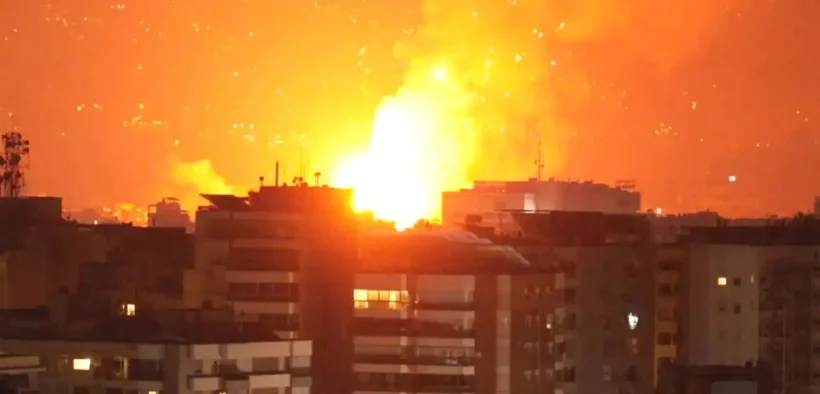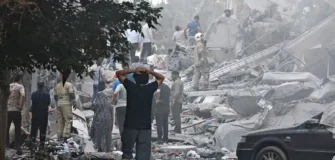Inside Israel’s Strikes on Iran: What Happened and How Iran Hit Back
Share

Israel has carried out major airstrikes on Iranian territory, targeting nuclear and military facilities, in an escalation that risks plunging the Middle East into a wider conflict.
The operation, which began overnight, saw Israeli jets strike more than 100 locations, including the Natanz nuclear site and compounds linked to Iran’s Revolutionary Guard.
The Israeli government says the attacks are a “preemptive measure” aimed at halting Iran’s accelerating nuclear programme.
Tehran has condemned the strikes, vowing “severe punishment.” State media reports that dozens have been killed or wounded, including senior military officials, although the exact toll remains unclear.
In response, Iran has launched a wave of drones towards Israel, with air defence sirens sounding in several cities, including Tel Aviv and Haifa.
What Started the War Between Israel and Iran?
The immediate trigger for the conflict was Israel’s preemptive airstrikes on Iranian territory. According to Israeli officials, the operation was launched because of mounting fears that Iran was rapidly advancing its nuclear programme and was close to developing nuclear weapons.
Key Factors:
Nuclear Escalation: The International Atomic Energy Agency (IAEA) recently reported that Iran had enriched uranium to nearly weapons-grade levels and was expanding its nuclear facilities. This raised alarms in Israel and the wider international community.
Breakdown in Diplomacy: Talks aimed at curbing Iran’s nuclear programme had stalled in recent weeks. Efforts in Oman and by other international mediators failed to produce a breakthrough, leaving Israel increasingly anxious about Iran’s intentions.
Israeli Security Concerns: Israeli leaders stated they believed Iran was “weeks away” from acquiring the capability to build a nuclear bomb. With diplomacy failing, Israel chose to act militarily to prevent what it described as an “imminent existential threat.”
Rising Tensions: In the days leading up to the strike, there were increased warnings, threats, and military activity on both sides. The U.S. and other countries began withdrawing embassy staff and military dependents from the region, anticipating possible escalation.
When Israel launched the airstrikes overnight, targeting Iranian nuclear and military sites, Iran responded immediately by launching drones at Israeli cities and threatening further retaliation. The conflict quickly escalated, drawing international concern and calls for restraint.
The United States has denied involvement in the Israeli strikes but confirmed that, prior to the attack, it ordered the evacuation of non-essential diplomatic staff and military dependents from Iraq, Kuwait, and Bahrain.
A spokesperson described the move as “precautionary” amid rising tensions in the region.
Flights over Iran and neighbouring countries have been suspended, and oil prices have surged as markets reacted to fears of a broader conflict.
People across Tehran and Tel Aviv reported a night of fear and confusion. “We woke up to explosions and didn’t know what to do,” one resident in Tehran told the BBC.
Hospitals in Israel have been placed on alert, and authorities have urged citizens to remain vigilant.
Iran’s Response Since the Israeli Airstrikes
Following Israel’s surprise airstrikes on multiple Iranian targets overnight, Iran’s leadership moved quickly to project strength and signal that retaliation was imminent.
Official Statements and Warnings
Shortly after the strikes, Iran’s Supreme Leader Ayatollah Ali Khamenei appeared on state television, condemning the attacks and vowing “severe punishment” for Israel. Iranian government officials described the Israeli operation as “an act of war” and promised that it would “not go unanswered.”
Military Actions
- Drone Launches: Within hours of the airstrikes, Iranian forces launched over 100 drones targeting Israeli territory. Israeli air defense systems were activated in several major cities, including Tel Aviv and Haifa, with explosions reported in the skies as the drones were intercepted.
- Regional Alerts: Iranian-backed groups in Lebanon, Syria, and Iraq have also issued statements of support for Tehran and warned of possible attacks on Israeli and U.S. interests in the region.
Domestic Mobilisation
- The Iranian military announced that it was on “maximum alert,” with all air defense units mobilised and reservists called up.
- Hospitals and emergency services across Iranian cities were placed on high readiness in anticipation of further strikes or civilian casualties.
In Tehran and other cities, thousands gathered in public squares, chanting anti-Israel slogans and burning Israeli flags. State media broadcast images of the crowds, reinforcing the government’s message of defiance.
Many ordinary Iranians spent the night in bomb shelters or safe rooms, fearing possible further escalation. “We are used to tension, but last night felt different, like we are truly at war now,” one Tehran resident told the BBC.
Iran’s foreign ministry summoned ambassadors from several Western countries to protest what it described as “Western complicity” in Israel’s actions.
Iranian diplomats also called for an emergency meeting of the United Nations Security Council, seeking global condemnation of the strikes.
Background
The crisis follows a period of heightened rhetoric between Israel and Iran, with diplomatic talks over Iran’s nuclear programme stalled.
The International Atomic Energy Agency recently reported that Iran has enriched uranium close to weapons-grade levels, a development Israel has described as an “imminent threat.”
World leaders have urged both sides to exercise restraint. Saudi Arabia and the European Union called for immediate de-escalation and a return to negotiations.
With both sides warning of further action, the risk of wider regional instability remains high. The United Nations Security Council has called an emergency meeting for later today.
This is a developing story. The Black Elites will continue to provide updates as more information becomes available.




















